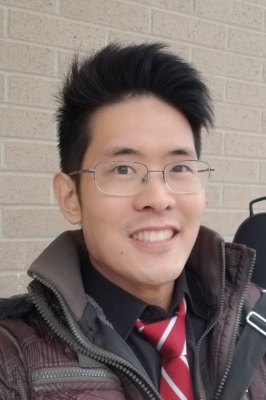Keng-Lou James Hung
Assistant Professor of Biology
Oklahoma Biological Survey
Ph.D., University of California, San Diego
B.A., Dartmouth College
405-325-4034

Ph.D., University of California, San Diego
B.A., Dartmouth College
405-325-4034
My research program seeks to achieve a mechanistic understanding of the impacts of environmental change on plant-pollinator mutualisms, and to quantify the consequences of such impacts on biodiversity conservation and ecosystem function. To that end, I apply techniques from community ecology, functional ecology, population biology, molecular biology, and pollination biology to my studies in both natural and human-modified ecosystems. Currently, research topics at the forefront of my lab include impacts of climate change and invasive species on pollinator and plant ecology and evolution, pollinator conservation in novel (anthropogenic) ecosystems, managing of wild pollinators for agricultural pollination, and refining of techniques for effective monitoring of pollinator populations.
As a pollination biologist in the Oklahoma Biological Survey and the Oklahoma Natural Heritage Inventory, I am also working to construct an inventory and distribution map of pollinator taxa within the state of Oklahoma, starting with native bees.
I am currently recruiting graduate students! Please get in touch if you are interested in any of the topics above, or have a pollination-related topic of your own that you would like to investigate!
Hung, K.-L.J., S.S. Sandoval, J.S. Ascher, and D.A. Holway. 2021. Joint impacts of drought and habitat fragmentation on native bee assemblages in a California biodiversity hotspot. Insects 12:135.
Hung, K.-L.J., J.S. Ascher, J.A. Davids, and D.A. Holway. 2019. Ecological filtering in scrub fragments restructures the taxonomic and functional composition of native bee assemblages. Ecology 100:e02654.
Hung, K.-L.J.*, J.M. Kingston*, A. Lee, D.A. Holway, and J.R. Kohn. 2019. Non-native honey bees numerically dominate abundant floral resources in a global hotspot of pollinator diversity. Proceedings of the Royal Society B 286:20182901. *Equal contribution
Hung, K.-L.J., J.M. Kingston, M. Albrecht, D.A. Holway, and J.R. Kohn. 2018. The worldwide importance of honey bees as pollinators in natural habitats. Proceedings of the Royal Society B 285:20172140.
Nabors, A.J.*, H.J. Cen*, K.-L.J. Hung, J.R. Kohn, and D.A. Holway. 2018. The effect of removing numerically dominant, non-native honey bees on seed set of a native plant. Oecologia 186:281–289. *Equal contribution
Hung, K.-L.J., J.S. Ascher, and D.A. Holway. 2017. Urbanization-induced habitat fragmentation erodes multiple components of temporal diversity in a Southern California native bee assemblage. PLOS ONE 12: e0184136.
Schochet, A.B., K.-L.J. Hung, and D.A. Holway. 2016. Bumble bee species exhibit divergent responses to urbanization in a Southern California landscape. Ecological Entomology 41:685–692.
Hung, K.-L.J., J.S. Ascher, J. Gibbs, R.E. Irwin, and D.T. Bolger. 2015. Effects of fragmentation on a distinctive coastal sage scrub bee fauna revealed through incidental captures by pitfall traps. Journal of Insect Conservation 19:175–179.
Hanna, C, I. Naughton, C. Boser, R. Alarcón, K.-L.J. Hung, and D.A. Holway. 2015. Floral visitation by the Argentine ant reduces bee visitation and plant seed set. Ecology 96:222–230.